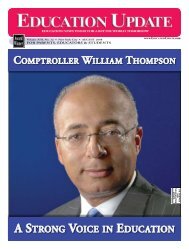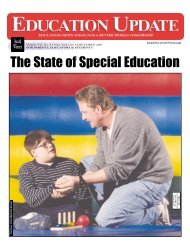Download PDF - Education Update
Download PDF - Education Update
Download PDF - Education Update
You also want an ePaper? Increase the reach of your titles
YUMPU automatically turns print PDFs into web optimized ePapers that Google loves.
cross The NationDECEMBER 2006 | EDUCATION UPDATE13by Sybil MaiminNewark Mayor Cor y Booker KeynotesNo Child Left Behind SymposiumNo Child Left Behind Criticized by Har vard Professorby Sybil MaiminTeachers College President Susan FuhrmanCory Booker, crusading youngmayor of Newark, NJ, RhodesScholar, Yale law graduate, and memberof the Columbia Teachers CollegeBoard of Trustees, electrified the roomwhile delivering the keynote addressat The Campaign for <strong>Education</strong>alEquity’s second annual symposiumwhich focused on No Child LeftBehind. Drawing upon his experiencesin Newark, a city plagued bycrime and corruption, Booker movinglydescribed both the despair andthe promise he has encountered. Hespoke of his “pain when I see youngpeople waste opportunities.” He vividlydescribed “kids who struggle, wholive on the edge as many young blackmen do.” He recounted his effortsat intervention, acting as mentor tomany, even to the boys caught spraypaintingdeath threats to him. He hasresponded by meeting the culpritsand working with them every weekend.“They are good kids who havebecome lost in the system,” he explains.His experiences have been eye-opening.Accompanying a troubled young black man to anice restaurant, he discovered his guest could notread the menu, an irony considering the lunchcounter protests in the ‘60’s and heroic efforts toobtain equal access. Speaking of senseless shootings,he lamented he goes to “more funerals forthe young than the old.” He also finds good inNewark. “It is amazing to see the lengths to whichparents will go” to find a decent education fortheir children. They fight to protect the schools,teachers, and principals that are excellent. TheyIn a scathing critique of the federal government’sNo Child Left Behind Act (NCLB), RichardF. Elmore, the Gregory R. Anrig Professor of<strong>Education</strong>al Leadership at Harvard UniversityGraduate School of <strong>Education</strong>, addressed “TheProblem of Capacity in the (Re) Design of<strong>Education</strong>al Accountability Systems.” He deliveredhis remarks before a large audience attendingThe Campaign for <strong>Education</strong>al Equity symposiumexamining NCLB. In his research, Elmorespends considerable time in classrooms observinghow schools respond to external pressuresfor accountability and how practitioners developprofessional practices to improve instruction. Hefaults the federal education policy for not ensuringthat low performing schools have adequatecapacity for improvement and states and districtshave resources to turn around failing institutions.There is currently no relationship betweennumber of failing schools and resources to effectneeded improvement. Many states have loweredstandards but are still burdened with excessivecase-loads. In Massachusetts, the number of failingschools has grown from 420 to 617, yet thestate is equipped to impact 5 to 6 schools a year.Elmore points to “a dramatic failure of designin NCLB as federal policy.” Annual tests withrigid limitations, fixed schedules of sanctions,and unclear definitions of proficiency have underminedflexibility needed to identify and improvefailing schools. NCLB provides no empiricalRyan Brenizer/Teachers CollegeNewark Mayor Cory Booker“plead” to get their youngsters into some of the“great charter schools” that Newark offers. Hesympathizes with desperate parents who falsifyaddresses to get their children into well-regardedsuburban schools and then suffer “the indignityof having their child followed around and pulledbasis to support its requirements and the federalgovernment shows no interest in providing suchevidence. Testing and coercion are now the primarymeans of regulatory control, yet, “Coercionproduces no effect.” The goals of governmentexceed capacity to produce desired outcomesresulting in “regulatory drift.” If it cannot fix theworse cases, NCLB loses credibility. “Good intentionsdo not result in greater capacity or better studentperformance,” explained Professor Elmore.“Performance is a function of capacity more thanof compliance,” and schools vary greatly in theirresponses to external pressures and new policies.Investment in social capital to develop trust andstrong internal working mechanisms is required.Relationships and support networks must be builtout of the school.” As to No ChildLeft Behind, the mayor finds “goodand bad in this complex legislation.”He believes “accountability” is key tosuccess. (A history of no accountabilityhas been disastrous for Newark.)He supports clear standards, sophisticatedways of measuring progress, andconsequences for failure. Noting thatthe nation cannot afford to waste itsmost valuable resource, the upcominggeneration, he stated, “We must findways of making the system work….We must expand islands of excellenceinto continents of success.” Whileothers speak of war as the great issueof the day, Booker believes the “biggestthreat to our democracy is internal,not external.” We have failed toachieve the “great ideals at the coreof our founding.” We are still “sofar away from manifesting the dreamof America.” Newark has lost moreyoung men to local gunfire than tothe battles in Iraq. In a soul-stirringsalute to James Baldwin and his bookThe Fire Next Time, Booker exclaimed,“I know in my heart…in Newark firesare going to blaze again, not of rebellion but ofhope… the torch of the American dream willilluminate American cities.” He urged, “We cando it. It’s not a question of ability; it’s a questionof desire.” #between schools and communities. The need fordifferential treatment to achieve improvementsmust be recognized. Yet, explained Elmore, politicalconsiderations favor testing and “regulatorydrift” rather than investment in social capital.With the practice of “blame-shifting,” if a schoolfails under NCLB, the institution can be blamed;if it succeeds, the elected official will take credit.There is “no electoral penalty for not investingin capacity.” Elmore sees “a major breakdownin political accountability” as “massive overinvestmentin testing” and “massive underinvestmentin capacity” produce a “growing imbalancebetween schools identified for improvement andthe capacity to support them.”#CampaignContinued from page 12With reference to performance outcomes ofspecial education students, some methodologicaldifferences, based on differences in definingsubgroups, remain in measuring performance ofspecial education students. Results of studies arethat an increased number of special education studentsare participating in statewide assessmentsfollowing the passage of NCLB. Qualitativestudies have revealed a beneficial effect forspecial education students instructed in gradelevel subject matter, and reports from mandatorystate-reported data as well as several nationallyrepresentative studies, show an increase in thegraduation rate, while other studies point to anincrease in the performance gap, particularly inCalifornia, Maryland, and NY.Addressing the performance of AfricanAmerican students, Dr. Michael Nettles, EdmundW. Gordon Chair for Policy Evaluation andResearch at the <strong>Education</strong>al Testing Service,reported that the achievement gap between blacksand whites, as measured by NAEP in 2005, is evidencedat grade four, and by grade eight, widensfurther in math and science. He attributes this gapto factors including a lack of qualified teachersfor African American students compared withwhite students. Poverty is a factor in the educationgap; there is a direct correlation betweenschools with a population of poorer children andunqualified teachers.He recommends attracting African Americanteachers, citing that currently only three percentof white students have African American teachers,while over 61 percent of African American studentshave white teachers. He further advises that additionalstudies be done to explore the current statusof family involvement in academic performance.Session IIIIn a session examining standards and assessmentsin education, Dr. Robert B. Schwartz, AcademicDean and Professor of Practice, Harvard UniversityGraduate School of <strong>Education</strong>, reported the generaldiscrepancy between state standards, and measuresof three independent organizations that have beenreviewing state standards and assessments overthe course of ten years. The Thomas B. FordhamInstitute found only three states worthy of an A,giving more than half the states grades of D orF. The American Federation of Teachers (AFT)found only 11 states met quality standards andassessments in line with those standards. Achieve,a national network focused on equal opportunityand access to post-secondary education reportedonly one out of 14 examined states as having highquality standards and assessments.Schwartz expressed agreement with Garcia andMcLaughlin, that a closing of the education gapcan be found in early, but not later years, andattributed this to inadequate state standards andassessments.Schwartz recommends investing in high qualityassessments, and underscored the need forstandards to be based on future employability andcitizenship requirements. He presented the possibilityof non-governmental organizations settingforth appropriate standards for curriculums andassessments. Such work has already progressedthrough the efforts of the American DiplomaProject (ADP), of Achieve, The <strong>Education</strong> Trust,and The Thomas B. Fordham Foundation, where26 states are currently working towards aligninghigh school standards with benchmarks set byADP.A second proposal, which Schwartz deemsmore controversial, is to change the role of theNational Assessment of <strong>Education</strong>al Progress(NAEP) in the context of the reauthorization ofNCLB. Its current role is based on the expectationof shaming states who do not meet theperformance standards of NAEP. Schwartz’s suggestionis for NAEP to serve as the new accountabilitymeasure, where states would be requiredto demonstrate progress—which would be basedon particular benchmarks for states depending ontheir level of performance—every two years.Dr. Diane Ravitch, Research Professor of<strong>Education</strong> at New York University reiterated thediscrepancy between NAEP and state assessments,and asserted her longstanding call fornational standards, especially in light of statisticsshowing one-third of college students requiringremedial services during freshman year, and testingon international standards across cities in theUS and the world.While she supports Schwartz’s idea of turningto the private sector for development of standards,she also believes the public sector in theform of “Federal Standards and tests overseenby a strictly non-partisan board of governors” isanother viable option.
















